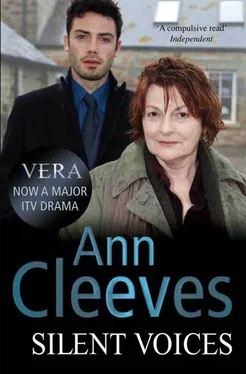Ashworth went on to tell them what Connie Masters did. ‘A couple of weeks later she called into the family in the evening. No appointment. Elias was in bed, so she didn’t see him, but that wasn’t what she was there for. The school was supposed to be looking out for him and she wanted a chat with the mother and the guy who had become, in effect, Elias’s stepdad. Apparently it was all very civilized. On the surface. Michael was at the table writing – work apparently – and Mattie was washing up the tea things. Masters noted that Mattie seemed rather subservient and eager to please.’
Charlie looked up. ‘One time,’ he said, ‘there’d have been nothing unusual about a man working and the woman making his tea.’ He coughed again and settled back into an angry silence. Everyone knew his domestic situation was fraught and they took no notice.
‘Another thing she noted,’ Ashworth continued as if Charlie had made no comment. ‘The telly had gone. When she was on her own with the boy, Mattie had liked the telly, talked about the soaps as if the characters were real people. Masters asked about it. She thought maybe it had gone for repair or they were waiting for a new one. “Michael doesn’t like the television,” Mattie said. “He thinks it dulls your mind.” No real answer to that one.’
Listening in her corner, Vera thought there were times when that was just what you wanted. To dull the mind. Whisky was her drug of choice, but she could see that television might work for some folk, the endless reruns of Morse or Midsomer Murders , the makeover shows and the talent contests, they might get you off to sleep at night.
‘So they had their meeting,’ Ashworth went on. ‘Mattie Jones, Connie Masters and Michael Morgan. Masters explained that they were concerned about Elias. He was losing concentration at school, subject to mood swings. Had they noticed any change in him at home? And Mattie – less than articulate at the best of times, according to Masters, a frail beauty who was hardly more than a child herself – only shook her head and looked sad.’ Ashworth looked directly at Holly. ‘And those words were taken straight from the inquiry notes. Michael said he’d tried to make friends with the boy. “But I’m not very good with children. Too self-centred, I’m afraid.” Then he added, surprising Masters, who wasn’t expecting such an immediate result, “Look, if it’s awkward, maybe I should move out. I don’t want to make things difficult for Mattie and Elias. That’s the last thing I’d want.” And Morgan was as good as his word. He was gone by the weekend, promising to stay in touch with Mattie, but going back to the flat that he’d never really given up at the complementary-therapy centre.’
Vera pushed her backside off the windowsill where it had been resting. It was time for her to take over now. Leave it to Ashworth, and they’d be here all day.
‘So the professionals all heaved a sigh of relief,’ she said briskly, ‘and thought the problem was solved. If anything was going on with the kid, then the cause of the trouble had been removed. Jenny Lister was the only one to counsel caution. She said Connie couldn’t assume Michael Morgan was at the root of the child’s anxiety, and told her to continue regular visits. Mattie was a damaged individual and still needed supervision and support. She sent an email to that effect to all the professionals who’d attended the original case conference. But Connie got distracted by the rest of her caseload: families with problems that seemed more urgent. And her own personal life was a shambles. She made a couple of flying visits to Mattie, who said everything was OK, but she didn’t see Elias again. It seemed that nobody spoke to Michael after that meeting at the flat. During the investigation that followed his death, it became clear that Elias was still having problems at school, but because of Jenny’s email, the teacher assumed Connie was involved with the family and was dealing with it. Almost exactly a year ago, the child died. He was drowned in the bath. Mattie drowned him. At first she said it was an accident, but during the first interview with police she admitted that she’d killed him. She blamed him for Michael walking out. And maybe she thought that if the boy wasn’t there, her man would come back to her.’
Vera looked around the room. She saw that she had their full attention. There were no facetious comments, no eyes rolled towards the ceiling to show they’d lost patience with all this talk. Usually they wanted action, but the death of a child affected them, made them quiet and still.
‘The officers investigating the child’s death spoke to Michael. It seemed bathtime was always a trauma for the boy. In interview, Mattie admitted that she used water as a punishment, held Elias’s head under until he choked.’ Vera kept her voice even, but imagined the scene in her head. Mattie whispering so that her lover couldn’t hear: Michael doesn’t like clutter. Michael doesn’t like noise. Be a good boy and this’ll never happen again. ‘It was hardly surprising he was freaked out by an unexpected wave at the seaside. In the court case her defence team tried to persuade the jury that the death was a repetition of the earlier incidents and she hadn’t meant to kill her son.’
Now the team members were furious, full of righteous indignation. ‘Didn’t the boyfriend try to stop her? How could a mother do that to her son?’
Vera answered the last question first. ‘The psychologist’s report talked about Mattie’s low IQ. Michael was the first man to show her any kindness and she was in love, head over heels, crazy for him. The psychologist was surprised at the use of water to exercise control over the boy. It’s not a normal form of punishment. She thought it likely Mattie had been treated the same way herself, perhaps by one of her foster parents or in residential care. Mattie might even have thought it was a normal way to behave.’
The room fell silent. ‘Michael claims he had no knowledge that Mattie was mistreating her son,’ Vera went on. ‘The CPS must have believed him. They never prosecuted.’ Then there was a release of tension, some chortles of derision. Nobody had much faith in the judgement of the CPS.
She looked at Ashworth. She’d stolen his thunder for long enough. Let him take over now.
‘The press blamed Connie Masters,’ he said. ‘She was suspended, then sacked. Took her dismissal to an industrial tribunal, but they upheld the social-services department decision. Jenny Lister’s memo clinched it. She’d instructed Masters to maintain her involvement with the case, not to focus exclusively on Michael.’
Ashworth paused. Vera wondered if he’d done amateur theatrics when he was at school. He could do a dramatic pause as well as anyone she knew. Almost. Nobody was quite as good as her when it came to summing up the essence of a case.
‘The important decision, of course,’ he said, looking around, making sure he had the full attention of his audience, ‘is whether this has any relevance to Jenny Lister’s murder, or if it’s entirely a coincidence.’
Ashworth sat in Connie Masters’s cottage. It was dark and dreary, full of second-hand furniture, everything shabby. The middle of the morning, but they still needed the standard lamp in the corner switched on. And the carpet could have done with a good clean. Joe and his wife furnished their home from Ikea, or Habitat if they could run to it, pale wood and lots of light, the occasional splash of colour.
His head was still full of the morning briefing. After the discussion of the Elias Jones case they’d gone over the pathologist’s report, listed possible suspects at the Willows. Vera had found the method of strangulation interesting. ‘Thin rope. Clever. Nowhere much to hide a murder weapon in swimming trunks or a costume, but you call ball the rope up into a fist and nobody would know you had it with you. That would make this a premeditated crime, wouldn’t it? And the killer must have known Jenny always used the steam room after a swim. He could have been in there waiting for her.’ Then she’d stopped, hit her forehead with the palm of her hand, one of her theatrical gestures, which made Joe think she’d been considering the possibility from the start. ‘What about the nylon string the staff wear round their necks to hold their name badges? Could something like that have killed her? Can we get a sample for comparison?’ Now, in the gloomy cottage, Joe tried to leave the briefing behind and concentrate on the present.
Читать дальше












